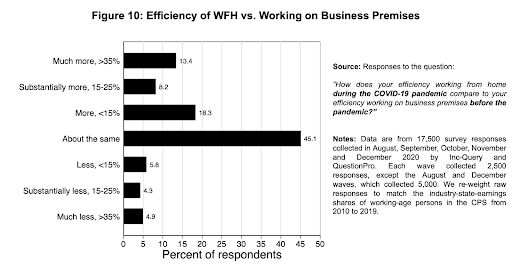In 2020, there was little choice: Send your employees home.
As COVID-19 swept across the world, bringing government mandates and national lockdowns with it, traditional office life was disrupted—and, while remote working blossoms even as the world returns to normal, perhaps irreversibly so.
Remote work is now about six times more prevalent than it was before COVID-19, and more and more office workers are expressing their preference for complete or partial remote work and changing jobs accordingly.
But, that doesn’t mean your business needs to work any less effectively or efficiently than it did pre-pandemic. Taken properly, the growing demand for a remote work culture shouldn’t be seen as a collective ransom demand headache from your workforce. In fact, it’s a mutually beneficial secret weapon that can unlock a new chapter for your organization and its employees.
Remote Work Opportunities Improve Hiring Pool and Retention
As demand for remote working cultures grows, answering the call can be a powerful boost to recruitment and growth efforts.
Businesses are finding hiring difficulties at their worst for 15 years, but remote work cultures can be an instant remedy for the problem of sourcing new talent.
Consider that if your business operates entirely from a physical site like an office, you’re restricting your hiring pool to about a 30-mile radius. This is all very well if your business sits in or near a large city, with thousands of suitable candidates on your doorstep who can reasonably and comfortably travel the distance 10 times a week.
But exactly by being in such an area, you’re automatically facing inflated operating costs and competition from dozens of other employers, and the perfect candidate with exactly the experience you’re looking for might be viewing your job listing, shaking their head, and moving on to a listing closer to home.
A remote working culture explodes your hiring pool radius to the size you want it to be: national, international, or transcontinental. In turn, you can take the pick of the best candidates for your company—not the best candidates within 30 miles.
What about retention? Consider the myriad benefits enjoyed by employees operating within a remote culture, as this infographic from the World Economic Forum illustrates.

Any business empowering its employees with the benefits of remote work, from skipping the commute to enjoying flexible autonomy, will naturally see a jump in morale and a fall in attrition. In fact, Global Workplace Analytics found 72% of remote employers agreeing that they saw a high level of impact on retention.
What does all this mean together? By offering remote opportunities, you’ll gain access to the world’s best talent for your role, who have a higher chance of staying in the role as well as greater loyalty and happiness once they’re hired. What business wouldn’t want that?
Evolving Remote Cultures
On top of that, the traditional criticisms of remote work—lonely, atomized, disruptive to a cohesive company culture—can be easily overcome with dedication and conscious effort.
When embracing remote work, it’s important to understand how a remote culture should be built and maintained. Some initiatives you may want to consider include:
- Emphasis on asynchronous work to knit teams across time zones
- Mechanisms for non-work chat as much as business talk, with Slack channels for gardening, football, cooking, pets, and more
- Meeting-free Focus Fridays and frequent wellness sessions
- Taking time to discuss personal lives on calls as well as work
Remote cultures are no longer something businesses scramble to piece together to cope with respiratory viruses; they are now viable alternatives to the office and, done properly, can connect workers and teams just as effectively.
Greater Efficiency
“Efficiency” is a difficult word to pin down. At its worst, it’s overused management speak that means next to nothing. But, it’s difficult to use another word when discussing the operational benefits of a remote culture and its ability to improve on traditional physical business models.
Not only do employees ditch the hours of time each week previously spent on soul-sucking commutes by car or train, they tend to work more productively, effectively, and—yes—efficiently once they get to work than they would in an office environment.
Being undistracted and focused in their own personal space can have considerable effects for day-to-day work, as the time sinks of office small talk and watercooler trips are plugged.
And since most communication is consciously scheduled and diarised in a remote culture, employees can prepare beforehand to get the maximum value from every interaction, making meetings tight, focused, and rewarding when they do happen.
The financial benefits of this approach have been investigated in detail since the pandemic began.
Consider the compounded financial costs of:
- Office real estate and upkeep costs
- Lost time from superfluous face-to-face interactions that slow task completion
- Sick days from those who are stressed, taking time to attend to personal affairs they couldn’t normally, and hit simultaneously by an office bug.
In contrast, Stanford professor Nicholas Bloom found remote workers less likely to fall ill and less likely to start work late, while the inevitable errands and non-work tasks of life don’t disrupt the working day as they would if you have to leave an office. The costs of a physical office, meanwhile, can be jettisoned entirely.
Naturally, this effect won’t apply to all your workforce in the same way, but while Bloom found just under half of employees estimating their efficiency was “about the same” at home as in an office, about 40% felt they were more efficient, and just 15% felt they were less.

On balance, a remote culture rids your business of wasted time, effort, and cost and sets up your workforce for more focused and profitable work.
Whether, and how, your business unlocks and applies these benefits is up to you.
Alex Pavlović is content marketing manager at Qualio, a leading provider of eQMS software to the life science industry. Pavlović has worked in the quality and compliance space for five years. Connect with Pavlović on LinkedIn.


